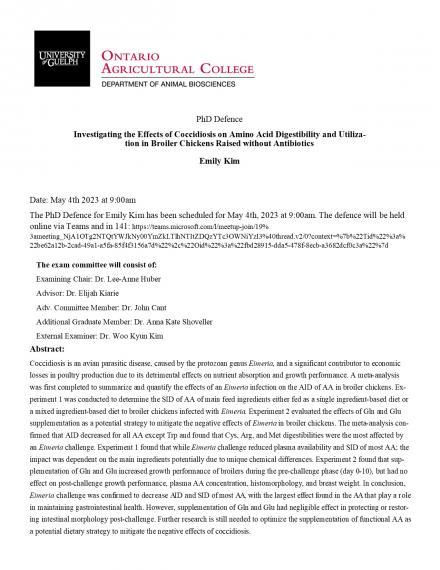Emily Kim's PhD Defence
Date and Time
Location
Room 141 and Teams: https://teams.microsoft.com/l/meetup-join/19%3ameeting_NjA1OTg2NTQtYWJkNy00YmZkLTlhNTItZDQzYTc3OWNiYzI3%40thread.v2/0?context=%7b%22Tid%22%3a%22be62a12b-2cad-49a1-a5fa-85f4f3156a7d%22%2c%22Oid%22%3a%22fbd28915-dda5-478f-8ecb-a3682dcf0c3a%22%7d

Details
Coccidiosis is an avian parasitic disease, caused by the protozoan genus Eimeria, and a significant contributor to economic losses in poultry production due to its detrimental effects on nutrient absorption and growth performance. A meta-analysis was first completed to summarize and quantify the effects of an Eimeria infection on the AID of AA in broiler chickens. Experiment 1 was conducted to determine the SID of AA of main feed ingredients either fed as a single ingredient-based diet or a mixed ingredient-based diet to broiler chickens infected with Eimeria. Experiment 2 evaluated the effects of Gln and Glu supplementation as a potential strategy to mitigate the negative effects of Eimeria in broiler chickens. The meta-analysis confirmed that AID decreased for all AA except Trp and found that Cys, Arg, and Met digestibilities were the most affected by an Eimeria challenge. Experiment 1 found that while Eimeria challenge reduced plasma availability and SID of most AA; the impact was dependent on the main ingredients potentially due to unique chemical differences. Experiment 2 found that supplementation of Gln and Glu increased growth performance of broilers during the pre-challenge phase (day 0-10), but had no effect on post-challenge growth performance, plasma AA concentration, histomorphology, and breast weight. In conclusion, Eimeria challenge was confirmed to decrease AID and SID of most AA, with the largest effect found in the AA that play a role in maintaining gastrointestinal health. However, supplementation of Gln and Glu had negligible effect in protecting or restoring intestinal morphology post-challenge. Further research is still needed to optimize the supplementation of functional AA as a potential dietary strategy to mitigate the negative effects of coccidiosis.